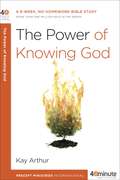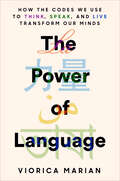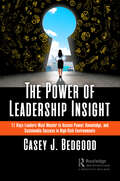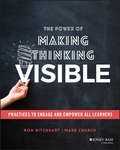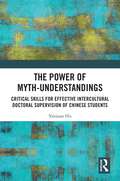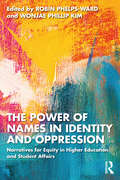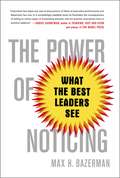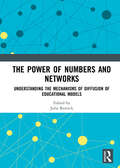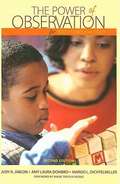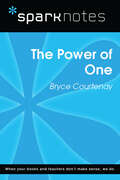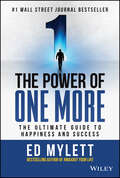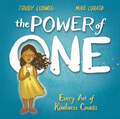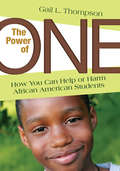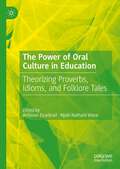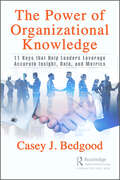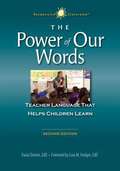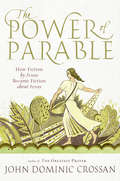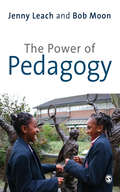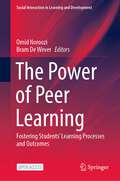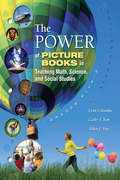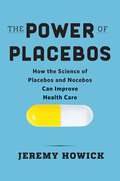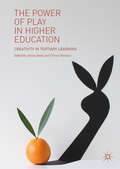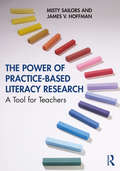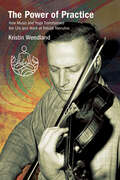- Table View
- List View
The Power of Knowing God: A 6-Week, No-Homework Bible Study (40-Minute Bible Studies)
by Kay ArthurDo you really know God? You may know about God, but do you truly know what He says about Himself--and what He wants from you? This eye-opening study will help you gain a true understanding of God's character and His ways. As you discover for yourself who He is, you'll be drawn into a deeper, more personal relationship with the God of the universe--a relationship that will enable you to confidently display His strength in life's most challenging circumstances.40 minutes a week could change your life! The 40-Minute Bible Studies series from the teaching team at Precepts Ministries International tackles the topics that matter to you. These inductive study guides, designed to be completed in just six 40-minutes lessons with no homework required, help you discover for yourself what God says and how it applies to your life today. With the leader's note and Bible passages included right in the book, each self-contained study is a powerful resource for personal growth and small-group discussion.
The Power of Language: How the Codes We Use to Think, Speak, and Live Transform Our Minds
by Viorica Marian&“Sparkles with insight.&”—Daniel PinkThis revolutionary book goes beyond any recent book on language to dissect how language operates in our minds and how to harness its virtually limitless power. As Dr. Marian explains, while you may well think you speak only one language, in fact your mind accommodates multiple codes of communication. Some people speak Spanish, some Mandarin. Some speak poetry, some are fluent in math. The human brain is built to use multiple languages, and using more languages opens doors to creativity, brain health, and cognitive control. Every new language we speak shapes how we extract and interpret information. It alters what we remember, how we perceive ourselves and the world around us, how we feel, the insights we have, the decisions we make, and the actions we take. Language is an invaluable tool for organizing, processing, and structuring information, and thereby unleashing radical advancement. Learning a new language has broad lifetime consequences, and Dr. Marian reviews research showing that it: · Enhances executive function—our ability to focus on the things that matter and ignore the things that don&’t. · Results in higher scores on creative-thinking tasks. · Develops critical reasoning skills. · Delays Alzheimer&’s and other types of dementia by four to six years. · Improves decisions made under emotional duress. · Changes what we see, pay attention to, and recall.
The Power of Leadership Insight: 11 Keys Leaders Must Master to Access Power, Knowledge, and Sustainable Success in High-Risk Environments
by Casey J. BedgoodLeadership is a risky business. In the current world, change is the new normal and only constant. As change grows, so does risk. Thus, leaders must be master change agents and master mitigators of risk. But, how will leaders succeed if they don’t measure and lack insight? Simply put, they won’t. Those that are successful in these arenas will ride the waves of success during their tenure on the leadership stage. In contrast, their counterparts will be crushed by the never-ending waves of disruption. Often leaders or those aspiring erroneously view leadership power from a self-interested perspective. They see power through the lens of a title, position, control over others, influence, emotional intelligence and the like. Unfortunately, this view is misaligned and short sighted. Another perspective of leadership is the ability to impact positive change for those around you. In reality, leaders are those that use their gifts, skills and knowledge to educate and empower others in the long run. The purpose of this book is to unveil insight as to the true meaning of leadership power – how to attain it, how to leverage it to add the greatest amount of value to humanity, how to weaponize it to marginalize and eliminate risk and how to share it with others so they can carry the torch once you step off the leadership stage. In this book, readers will learn: How to master the art of change The value of leadership self-advocacy The pearls and pitfalls of leading integration teams The unintended consequences of sharing knowledge The sidewinder effect of misinterpreting root causes of success The leadership test of humility Leadership matchmaking to ensure the right leaders are selected to solve the organization’s problems Leadership Loopholes: The Houdini Effect The risk of underestimating leadership value The risk of not focusing on the right attributes The risk of leading turnarounds
The Power of Making Thinking Visible: Practices to Engage and Empower All Learners
by Ron Ritchhart Mark ChurchThe long-awaited follow-up to Making Thinking Visible, provides new thinking routines, original research, and unique global case studies Visible Thinking—a research-based approach developed at Harvard’s Project Zero – prompts and promotes students’ thinking. This approach has been shown to positively impact student engagement, learning, and development as thinkers. Visible Thinking involves using thinking routines, documentation, and effective questioning and listening techniques to enhance learning and collaboration in any learning environment. The Power of Making Thinking Visible explains how educators can effectively use thinking routines and other tools to engage and empower students as learners and transform classrooms into places of deep learning. Building on the success of the bestselling Making Thinking Visible, this highly-anticipated new book expands the work of the original by providing 18 new thinking routines based on new research and work with teachers and students around the world. Original content explains how to use thinking routines to maximum effect in the classroom, engage students exploration of big ideas, link thinking routines to formative assessment, and more. Providing new research, new global case studies, and new practices, this book: Focuses on the power that thinking routines can bring to learning Provides practical insights on using thinking routines to facilitate student engagement Highlights the most effective techniques for using thinking routines in the classroom Identifies the skillsets and mindsets needed to truly make thinking visible Features actionable classroom strategies that can be applied across grade levels and content areas Written by researchers from Harvard’s Project Zero, The Power of Making Thinking Visible: Using Routines to Engage and Empower Learners is an indispensable resource for K-12 educators and curriculum designers, higher education instructional designers and educators, and professional learning course developers.
The Power of Myth-understandings: Critical Skills for Effective Intercultural Doctoral Supervision of Chinese Students
by Yanjuan HuThe book addresses the misunderstandings and implicit stereotypes that continue to arise in and influence the intercultural encounters of staff and international doctoral students.In addition to providing real-life examples, the author demonstrates that misunderstandings recur due to a lack of implicit and complex intercultural knowledge and practical tools for applying this knowledge in daily practice. She proposes the concept of "myth-understanding" to describe a temporary and transitional state of clarity deficiency before misunderstandings arise, which helps to create a "buffer zone" to address potential misunderstandings between international students and their supervisors. Instead of focusing on the negative aspects of misunderstandings, the book sheds light on the positive side—it indicates that intercultural differences can provide an opportunity for both supervisors and students to develop implicit intercultural knowledge, challenge their preconceptions of each other, and reassess their own educational perspectives and practices.The book will attract scholars of intercultural education, European university staff and professors who interact with international students, intercultural education officers, and doctoral students with an international (especially Asian) background.
The Power of Names in Identity and Oppression: Narratives for Equity in Higher Education and Student Affairs
by Robin Phelps-Ward Wonjae Phillip KimStories and personal narratives are powerful tools for engaging in self-reflection and application of critical theory in higher educational contexts. This edited text centers "name stories" as a vehicle to promote readers’ understanding of social identity, oppression, and intersectionality in a variety of educational contexts from residence halls and classrooms to faculty development workshops and executive leadership board rooms. The contributors in this volume reveal how names may serve as entry points through which to foster learning and facilitate conversations about identity, power, privilege, and systems of oppression. Through an intersectional perspective, chapter authors reveal interlocking systems of oppression in education while also providing recommendations, lessons learned, reflection questions, and calls to action for those working to transform and advance equity-minded campus climates. This unique volume is for educators at colleges and universities doing equity work, seeking ways to initiate, facilitate, and maintain rich conversations about identity.
The Power of Noticing
by Max BazermanFrom Harvard Business School Professor and Co-Director of the Harvard Kennedy School's Center for Public Leadership: A guide to making better decisions, noticing important information in the world around you, and improving leadership skills.Imagine your advantage in negotiations, decision-making, and leadership if you could teach yourself to see, and evaluate, information that others overlook. The Power of Noticing provides the blueprint for accomplishing precisely that. Max Bazerman, an expert in the field of applied behavioral psychology, draws on three decades of research and his experience instructing Harvard Business School MBAs and corporate executives to teach you how to notice and act on information that may not be immediately obvious. Drawing on a wealth of real-world examples, from the Challenger Space Shuttle disaster to Bernie Madoff's Ponzi scheme, Bazerman diagnoses what information went ignored in these situations, and why. Using many of the same case studies and thought experiments designed in his executive MBA classes, he challenges readers to explore their cognitive blind spots, identify any salient details they are programmed to miss, and then take steps to ensure it won't happen again. While many bestselling business books have explained how susceptible to manipulation our irrational cognitive blindspots make us, Bazerman helps you avoid the habits that lead to poor decisions and ineffective leadership in the first place. His book provides a step-by-step guide to breaking bad habits and spotting the hidden details that will change your decision-making and leadership skills for the better, teaching you to: pay attention to what didn't happen; acknowledge self-interest; invent the third choice; and realize that what you see is not all there is. With The Power of Noticing at your side, you can learn how to notice what others miss, make better decisions, and lead more successfully.
The Power of Numbers and Networks: Understanding the Mechanisms of Diffusion of Educational Models
by Julia ResnikThis book is an important contribution to the understanding of the complex education policies of the twenty-first century. It unites world renowned comparatists of education in an effort to respond to the challenges raised by the multidimensional and multi-scalar aspects of education policies. In their attempt to decipher the tangled world of education policies, the authors underline the power of numbers, the power of networks and the power of new concepts and methodologies. The power of numbers – education through numbers via students’ assessments and national or international testing impacts upon our educational choices and reinforces its instrumental aspects. The power of networks – sheds light on the complexity of the education global governance network by focusing on how international governmental organisations (IGOs), such as UNESCO, the OECD and the World Bank carry out policy and on the intricate ways an educational concern becomes part of the international agenda. The power of concepts and methods – policymaking is increasingly dynamic and involves many different stakeholders, including states, private corporations, IGOs, scholars and non-profit organisations. Contributors to this volume have developed new conceptual and methodological perspectives to study the circulation of educational models worldwide. A relational notion of space, the concept of ‘diaspora’ as a space of relations of social actors or the global comparative approach and a methodology drawn on actors-network theory are among the propositions yielded by the authors in order to make sense of and grasp the complexity of education policies today. This book was originally published as a special issue of Globalisation, Societies and Education.
The Power of Observation Second Edition
by Amy Laura Dombro Judy R. Jablon Margo L DichtelmillerThe Power of Observation explores the vital connection between observation and effective teaching. In this book, the authors share their own and others' experiences to illustrate how observation helps teachers and caregivers become more effective in the child care center, preschool, family child care home, and elementary classroom.
The Power of One (SparkNotes Literature Guide Series)
by SparkNotesThe Power of One (SparkNotes Literature Guide) by Bryce Courtenay Making the reading experience fun! Created by Harvard students for students everywhere, SparkNotes is a new breed of study guide: smarter, better, faster. Geared to what today's students need to know, SparkNotes provides: *Chapter-by-chapter analysis *Explanations of key themes, motifs, and symbols *A review quiz and essay topicsLively and accessible, these guides are perfect for late-night studying and writing papers
The Power of One More: The Ultimate Guide to Happiness and Success
by Ed MylettYou're one more intentional thought and action away from discovering your best life In The Power of One More, renowned keynote speaker and performance expert Ed Mylett draws on 30 years of experience as an entrepreneur and coach to top athletes, entertainers, and business executives to reveal powerful strategies to help you live an extraordinary "one more" life. In The Power of One More, you'll: Learn why you're closer to your dreams and goals than you think and why using The Power of One More strategies will help you cross the finish line in whatever race you're running Understand the psychology and science of how to use The Power of One More in every part of your life to help you solve problems and achieve levels of success you never thought possible Discover time-tested and unique solutions to challenges that will remove the mental roadblocks you've been battling for years Perfect for anyone who wants more bliss, wealth, or better relationships, The Power of One More is an indispensable roadmap to realizing and exceeding your personal and professional goals by tapping into the superpowers and gifts you already have inside you.
The Power of One: Every Act of Kindness Counts
by Trudy LudwigOne small act of kindness can change the world. From esteemed bullying expert and author of The Invisible Boy, Trudy Ludwig and Little Elliot illustrator Mike Curato comes a tale as simple--and simply inspiring--as the golden rule.When one child reaches out in friendship to a classmate who seems lonely, she begins a chain reaction of kindness that ripples throughout her school and her community. One kind act begets another, small good deeds make way for bigger ones, and eventually the whole neighborhood comes together to build something much greater than the sum of its parts.From acclaimed bullying expert Trudy Ludwig, The Power of One not only conveys a message of kindness, it offers concrete steps that kids can take to make a difference in their own communities.As Trudy says in the final line of the book: "Acts and words of kindness DO count, and it all starts with ONE."
The Power of One: How You Can Help or Harm African American Students
by Gail L. ThompsonYOU have the power to make a difference with your African American students! This interactive staff development resource helps educators deal with the main barriers—often personal assumptions or mind-sets—that can impede their progress with African American K–12 students. Calling upon readers to embark upon a personal journey to address these issues, the author skillfully combines moving first-person narratives, personal growth exercises, and informational text, and shows educators how to: Deal with obstacles to successful classroom management; Foster positive interactions within the classroom; Prepare African American students to succeed on standardized tests; Build positive relationships with African American parents.
The Power of Oral Culture in Education: Theorizing Proverbs, Idioms, and Folklore Tales
by Njoki Nathani Wane Ardavan EizadiradThis volume explores the importance of inter-generational oral culture and stories that transcend time, space, and boundaries transmitted historically from one generation to the next through proverbs, idioms, and folklore tales in different geographical and spatial contexts. These important stories and their embedded life lessons are introduced, explained, and supplemented with pre and post educational activities and lesson plans to be used as learning resources. The centering of orality as a tool and medium for educating the future generation is a reclamation and reaffirmation of Indigeneity, Indigenous knowledges. and non-hegemonic approaches to support students in a socio-culturally sustaining manner. Through this understanding, this book explores the interconnectedness between culture, traditions, language, and way of life through oral storytelling, sharing, and listening.
The Power of Organizational Knowledge: 11 Keys that Help Leaders Leverage Accurate Insight, Data, and Metrics
by Casey J. BedgoodIs knowledge powerful? Do leaders and those aspiring really understand the importance and power of organizational knowledge? Can knowing accelerate one’s career journey, while not knowing disrupt success? Will leaders and organizations achieve their full potential and mission without leveraging organizational knowledge? This book is for leaders, aspiring leaders, professionals, students, performance improvement practitioners, and strategists regardless of industry. It provides a quick, clear, and concise guide for readers to understand organizational knowledge, create knowledge transfer plans, and leverage knowledge to lead from the front. Without knowledge, leaders and their organizations will eventually operationally perish. In this book, leaders will learn the power of the following: • Strategic knowledge• Knowledge related to organizational governance and structure• Creating knowledge plans and capturing and sharing knowledge• Leveraging organizational knowledge in integrating organizations and building teams• Knowledge in leadership decision making
The Power of Our Words: Teacher Language that Helps Children Learn (Second Edition)
by Paula DentonSimple changes in a teacher's language can bring about profound changes in students and classrooms. By paying attention to your words and tone of voice, you will: Increase students' engagement with academicsBuild positive communityMore effectively manage your classroom That is the message of The Power of Our Words, a book that has changed the teaching lives of tens of thousands of educators since it was first published in 2007. In this updated second edition you will find practical information to help you: Lead students in envisioning themselves achieving successUse questions that encourage deep and creative thinkingListen to students in ways that support their growthReinforce students efforts and remind or redirect them when they go off track. Throughout, you will find an increased emphasis on using teacher language to support academic engagement and critical thinking skills as called for in the Common Core State Standards. And an updated, livelier format makes this second edition even easier to read.
The Power of Parable: How Fiction by Jesus Became Fiction about Jesus
by John Dominic CrossanIn 1969, I was teaching at two seminaries in the Chicago area. One of my courses was on the parables by Jesus and the other was on the resurrection stories about Jesus. I had observed that the parabolic stories by Jesus seemed remarkably similar to the resurrection stories about Jesus. Were the latter intended as parables just as much as the former? Had we been reading parable, presuming history, and misunderstanding both? -from The Power of Parable So begins the quest of renowned Jesus scholar John Dominic Crossan as he unlocks the true meanings and purposes of parable in the Bible so that modern Christians can respond genuinely to Jesus's call to fully participate in the kingdom of God. In The Power of Parable, Crossan examines Jesus's parables and identifies what he calls the "challenge parable" as Jesus's chosen teaching tool for gently urging his followers to probe, question, and debate the ideological absolutes of religious faith and the presuppositions of social, political, and economic traditions. Moving from parables by Jesus to parables about Jesus, Crossan then presents the four gospels as "megaparables." By revealing how the gospels are not reflections of the actual biography of Jesus but rather (mis)interpretations by the gospel writers themselves, Crossan reaffirms the power of parables to challenge and enable us to co-create with God a world of justice, love, and peace.
The Power of Pedagogy
by Jenny Leach Robert E. Moon'[This book] is readable, engaging, informative and provoking' - Tony Rae, ESCalate 'The book is encompassing all my own passions as a holistic practitioner; I feel it is multi-cultural, offering powerfully diverse and inclusive ideas of pedagogy. In particular, the concepts of this book are like a breath of fresh air for the 'disabled' student, talking about alternative assessment etc.' - Helene McArthur, ESCalate `Every now and again you come across a really important book that shifts and clarifies your thinking. The Power of Pedagogy is one of those books. Here you'll find a fascinating analysis of the myriad of issues and ideas surrounding teaching and learning today. Drawing on history, theory and vignettes form today's classrooms, these two experienced and active thinkers and practitioners have managed to provide new perspectives on the pedagogic mission. A remarkable piece of scholarship, it's a 'must' for all those setting out to teach and for those already teaching with the sort of intellectual curiosity that is the hallmark of the outstanding teacher' - Tim Brighouse, formerly Adviser for London Schools, is Visiting Professor at the Institute of Education 'This important book manages to combine an illuminating breadth of global reference with real insight into the practice of teaching and learning. Its highly readable investigative narrative integrates theory and practice with a quality of analysis that is both rare and entirely convincing' - Sir David Winkley, former Headteacher Grove School, Handsworth and government education advisor The concept of 'pedagogy' has become increasingly important as a frame of reference for debate about teaching and learning. In this book the authors analyse and explore contemporary ideas of pedagogy through the work of key figures including Freire, Montessori and Vygotsky, and explain how a new conception of pedagogy could transform educational institutions, particularly schools. In locating pedagogy as central to the process of education the authors: - explore the historical and cultural antecedents of our understanding of pedagogy - analyse the way understanding of the working of the human mind influences teaching and learning - review and critique ideas about learning and the construction of knowledge - examine the way new forms of communication are impacting on the processes and purposes of pedagogic activity. Highly relevant for masters and doctoral students of education, this book will also be of interest to educational practitioners undertaking research on issues related to pedagogy, both in the UK and internationally. Bob Moon and the late Jenny Leach have written extensively on pedagogy, teacher education and international developments in the field, including Learners and Pedagogies (1999). They lead the Research Group on Teacher Education across Societies and Cultures (RITES) at the Open University, UK. Bob Moon is Professor of Education at the Open University and Director of the Teacher Education in Sub-Saharan Africa (TESSA) Programme. Jenny Leach was Professor of Teacher Learning and Development at the Open University.
The Power of Peer Learning: Fostering Students’ Learning Processes and Outcomes (Social Interaction in Learning and Development)
by Omid Noroozi Bram De WeverThis open access book explores new developments in various aspects of peer learning processes and outcomes. It brings together research studies examining how peer feedback, peer assessment, and small group learning activities can be designed to maximize learning outcomes in higher, but also secondary, education.Conceptual models and methodological frameworks are presented to guide teachers and educational designers for successful implementation of peer learning activities with the hope of maximizing the effectiveness of peer learning in real educational classrooms.There is a strong emphasis on how technology-enhanced tools can advance peer learning, both with respect to designing and implementing learning activities, as well as analyzing learning processes and outcomes.By providing empirical studies from different peer learning initiatives, both teachers and students in academic and professional contexts are informed about the state of the art developments of peer learning.This book contributes to the understanding of peer learning challenges and solutions in all level of education and provide avenues for future research. It includes theoretical, methodological, and empirical chapters which makes it a useful tool for both teaching and research.
The Power of Picture Books in Teaching Math and Science: Grades Prek-8
by Lynn ColumbiaThis book's 50-plus lessons-each based on a different picture book or story-will help classroom teachers build a foundation for teaching math, science, and social studies concepts to their students. Each lesson uses children's literature to make challenging, abstract concepts relevant to children's lives, inviting them to learn these concepts while responding to a story's illustrations, theme, characters, and plot. The lessons also demonstrate how teachers can use children's literature to meet national standards in math, science, and social studies. Chapters 1 through 5 set the stage for using picture books, discussing the effective, imaginative integration of literature into the classroom. Teachers will learn to create an environment that ensures that when children and books come together, the experience is enjoyable and thought provoking. Chapters 6 through 9 provide individual lessons, by grade level, with detailed activities based on specific books.
The Power of Place, the Problem of Time
by Keith Thor CarlsonThe Indigenous communities of the Lower Fraser River, British Columbia (a group commonly called the Stó:lõ), have historical memories and senses of identity deriving from events, cultural practices, and kinship bonds that had been continuously adapting long before a non-Native visited the area directly. In The Power of Place, the Problem of Time, Keith Thor Carlson re-thinks the history of Native-newcomer relations from the unique perspective of a classically trained historian who has spent nearly two decades living, working, and talking with the Stó:lõ peoples.Stó:lõ actions and reactions during colonialism were rooted in their pre-colonial experiences and customs, which coloured their responses to events such as smallpox outbreaks or the gold rush. Profiling tensions of gender and class within the community, Carlson emphasizes the elasticity of collective identity. A rich and complex history, The Power of Place, the Problem of Time looks to both the internal and the external factors which shaped a society during a time of great change and its implications extend far beyond the study region.
The Power of Placebos: How The Science Of Placebos And Nocebos Can Improve Health Care
by Jeremy HowickThe Power of Play in Higher Education: Creativity in Tertiary Learning
by Alison James Chrissi NerantziThis book examines the increasing popularity of creativity and play in tertiary learning, and how it can be harnessed to enhance the student experience at university. While play is often misunderstood as something ‘trivial’ and associated with early years education, the editors and contributors argue that play contributes to social and human development and relations at a fundamental level. This volume invalidates the commonly held assumption that play is only for children, drawing together numerous case studies from higher education that demonstrate how researchers, students and managers can benefit from play as a means of liberating thought, overturning obstacles and discovering fresh approaches to persistent challenges. This diverse and wide-ranging edited collection unites play theory and practice to address the gulf in research on this fascinating topic. It will be of interest and value to educators, students and scholars of play and creativity, as well as practitioners and academic leaders looking to incorporate play into the curriculum.
The Power of Practice-Based Literacy Research: A Tool for Teachers
by James V. Hoffman Misty SailorsAccessible and inviting, this book showcases how teachers and literacy coaches can use research as a tool to teach literacy effectively and with intention. Sailors and Hoffman invite literacy specialists and practicing and preservice teachers into a conversation about how they can use research as means for professional learning, mentorship, and empowerment. Chapters feature a wealth of tools, examples, and strategies that make key concepts in literacy research refreshing and practical. This book invites the reader to pause and reflect on the practical knowledge through special features in the book and available online as eResources, including: "Points to Consider" boxes to encourage reflection and deeper thinking "Pause and Reflect" boxes to give the reader space to apply concepts to their own work as practice-based researchers eResources with recommended readings and "Meet the Teacher" exemplars of teachers’ stories to provoke further reflection, available on the book’s webpage: www.routledge.com/9780367177607 Perfect for literacy specialists, coaches and consultants in literacy, ELA/literacy teachers, as well as preservice teachers, this book is a comprehensive and engaging guide to using research as a means to transform classrooms.
The Power of Practice: How Music and Yoga Transformed the Life and Work of Yehudi Menuhin (SUNY Press Open Access)
by Kristin WendlandThe Power of Practice showcases the pioneering achievements of renowned violinist Yehudi Menuhin (1916-99) and how both disciplines transformed his life and practice. Menuhin's contributions as a performer, teacher, and humanitarian are celebrated around the world. Less well known, however, is Menuhin's devotion to the practice of yoga and his close friendship with the renowned yogi B. K. S. Iyengar (1918–2014), whose guidance profoundly influenced Menuhin as both a musician and a philanthropist. Menuhin applied his understanding of Iyengar's teachings to his philosophy of musical practice, creating new ways to approach the teaching of violin technique. He also took broader lessons from yoga to inform his approach to interacting with the larger world as a cultural ambassador and influential artist. Through the lens of the life and work of the celebrated violinist and devoted yogi, this book uncovers deep connections between music and yoga. It shows how the practice of both disciplines can profoundly transform our world into a better place.
